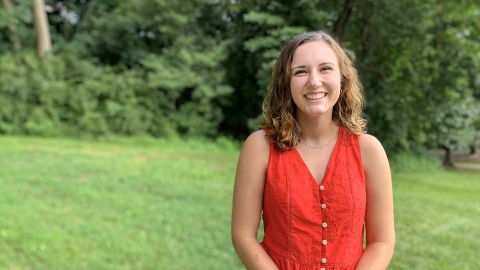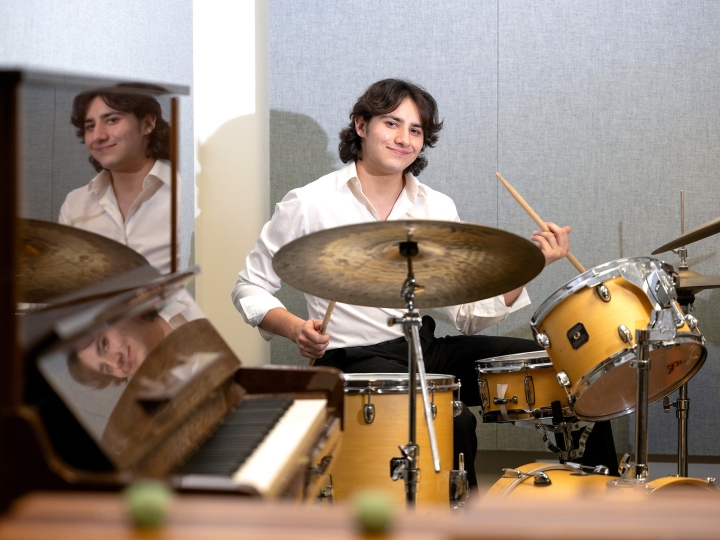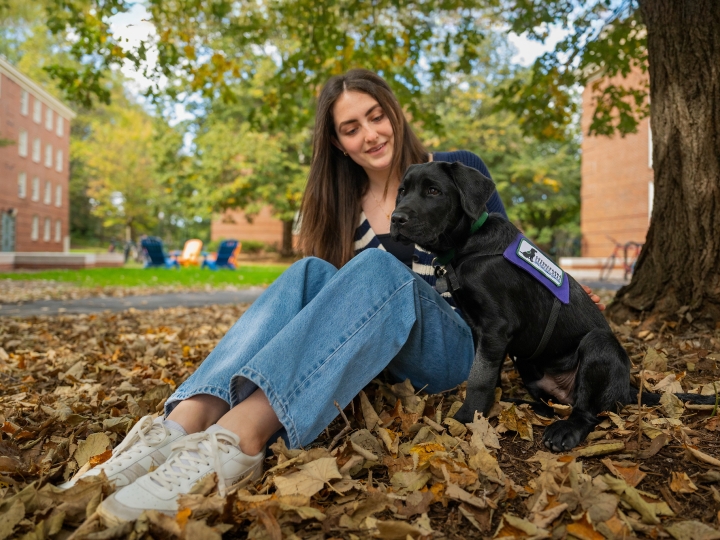
Nicole Reddig ’22, Education and Political Science
September 4, 2020
Nicole Reddig '22 is conducting research that sits at the intersection of her dual majors: education and political science. Photo by Savannah Mead
The American accent was a dead giveaway.
In the fall of 2019, Nicole Reddig '22 was meeting with constituents as part of an internship with Catherine West, a member of the U.K. Parliament, when a woman asked her the 64,000-pound question.
"Why is an American telling me to vote Labour?" the woman asked.
Reddig, an education and political science double-major from Brownstown, Pa., had an answer ready to go.
"I explained that I was in London to learn about comparative politics and comparative democratic systems," she says. "And that I wanted to serve the people in her constituency and in Greater London while I was there."
The internship reminded Reddig that politics is as much about writing legislation and debating policy as it is about helping everyday people solve problems. That emphasis on local outreach consumed Reddig's semester abroad. She spent day after day responding to emails and letters not with boilerplate responses but with actual, handcrafted words.
"The day to day would be rough, because you have people confessing some of their biggest problems," Reddig says. "It definitely took a lot of emotional stamina."
Victories large and small made these efforts worthwhile. Like when she helped reunite a family after their asylum claim had been denied for years. Or when she found a bed at a hotel so a homeless pregnant woman wouldn't have to sleep on the street.
"It was rewarding to actually feel like you were helping people," she says.
Back on this side of the Atlantic, Reddig has been volunteering on congressional campaigns since before she could vote. In doing so, she became convinced that U.S. politicians need to do a better job remembering who puts them in office.
"Our politicians need to empathize more with people in their communities," she says. "I think one of the most powerful things you can do is just go knock on someone's door and say, 'How can I help you?'"
The Intersection of Education and Policy
Curiosity led Reddig to choose Bucknell.
She wanted a school where she could ask difficult questions, become heavily involved in campus life and "just jump right into research."
One of the more difficult questions Reddig is tackling sits at the intersection of her dual majors: education and political science. For her Presidential Fellowship project, Reddig is working alongside Professor Janet VanLone, education, to research the national teacher shortage to determine specific government policies that might turn things around.
"My education courses have really shown me the teachers' side of things — how schools are set up and how they can best help students," Reddig says. "And in my political science classes, I've seen how governance plays into that and how resources are allocated."
There are the obvious explanations for why some teachers leave: low pay, harsh working conditions, a lack of autonomy in the classroom. But Reddig has also returned to that U.K. vs. U.S. lesson of communication: two sides speaking the same language but with different accents.
"I find that a lot of times, policymakers live in a bubble where they may not be talking to educators about what they need," Reddig says. "I'd like to kind of bridge that gap between the two disciplines."
The stakes couldn't be higher. In a 2015 report from the Organisation for Economic Co-operation and Development, the U.S. ranked 40th in the world in mathematics, 25th in science and 24th in reading. With the right policies in place to recruit and retain teachers, Reddig believes the country can improve those rankings dramatically.
"It's important that we have teachers in the classroom who are fostering this love of learning and academic culture," she says. "We're going to need people who are passionate about their jobs and to give them the support and resources they need to stay in the classroom."
To get there, Redding knows she'll need more than just a plan. She'll also need to know how to present that plan in a way that will resonate with the general public.
Through writing pieces for The Bucknellian student newspaper, working with the Bucknell Institute for Public Policy and engaging in small, seminar-type classes, Reddig is learning how to synthesize her thoughts.
"I really like classes that bring in a group of people from different majors and different perspectives," she says, "to really have that intellectual conversation."

